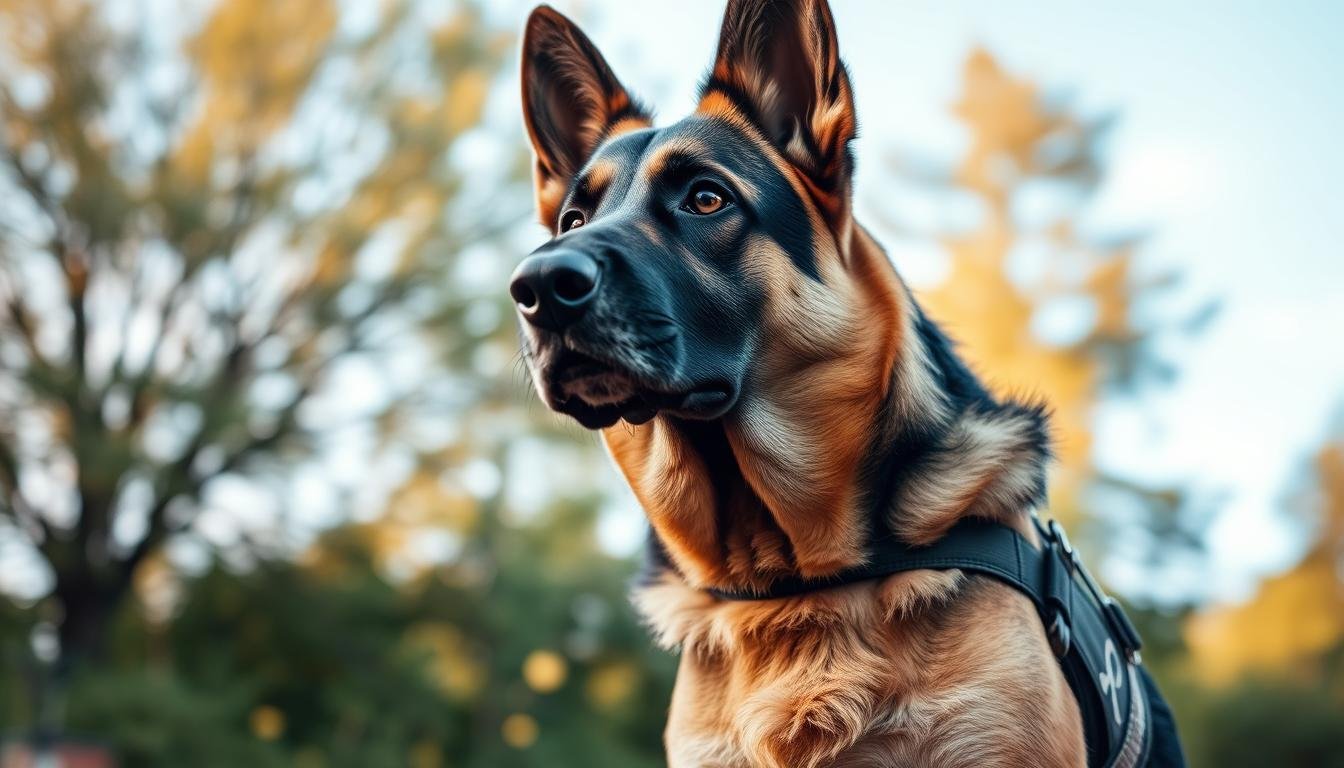The Best and Worst Jobs for German Shepherds as Working Dogs
German Shepherds are renowned for their intelligence and loyalty, making them one of the most versatile and capable working dog breeds in the world.
With their unique combination of physical capabilities and work ethic, they excel in various professional roles. However, not all jobs are suitable for German Shepherds, and matching the right role to your dog’s individual temperament is crucial for their mental and physical wellbeing.
Understanding the right job for your German Shepherd can lead to a happier, healthier, and more fulfilled canine companion. This guide will cover both ideal and unsuitable working roles for German Shepherds, helping you make an informed decision.
Key Takeaways
- Understanding the importance of matching your German Shepherd to the right working role.
- Identifying the unique characteristics that make German Shepherds suitable for various jobs.
- Learning about the potential risks of assigning unsuitable jobs to your German Shepherd.
- Gaining insights into the ideal working roles for German Shepherds.
- Discovering how to ensure your German Shepherd’s mental and physical wellbeing in a working role.
Understanding the German Shepherd’s Working Dog Heritage
German Shepherds have been utilized in various working roles for over a century, showcasing their versatility and work ethic. Their history as a working dog is deeply rooted in their original purpose as herding and guarding dogs.
Origins as Herding and Guarding Dogs
The German Shepherd breed was developed in the late 1800s with the primary goal of creating a dog that could herd and protect flocks. Captain Max von Stephanitz, a German cavalry officer, is credited with founding the breed. He was impressed by the intelligence, strength, and herding ability of the dogs he saw at a dog show in Berlin in 1899. Von Stephanitz purchased a dog named Hektor Linksrhein, later renamed Horand von Grafrath, which became the first registered German Shepherd Dog. The breed quickly gained popularity for its herding prowess and was soon utilized for guarding and other tasks.
The Evolution of German Shepherds as Multi-Purpose Working Dogs
As the years progressed, the German Shepherd transitioned from purely agricultural roles to more diverse working roles. During World War I, they were utilized by the German military for various tasks, including messaging, guarding, and rescue operations. Their versatility and trainability made them an asset, and by World War II, they were also being used by the United States military. Today, German Shepherds continue to serve in military and police capacities, leveraging their intelligence, athleticism, and loyalty. They have also become invaluable as guide dogs, search and rescue dogs, and in other specialized roles.
The adaptability of the German Shepherd has allowed it to excel in an array of working roles, from law enforcement and military service to being the first guide dogs for the blind. Their pioneering role in various fields is a testament to their intelligence, trainability, and strong work ethic.
Key Characteristics That Make German Shepherds Excellent Working Dogs
Several factors contribute to the German Shepherd’s excellence as a working dog, including their intelligence, physical prowess, and loyalty. These characteristics, combined with their adaptability, make them highly sought after for various roles.
Intelligence and Trainability
German Shepherds are known for their high intelligence and trainability. They quickly grasp commands and tasks, making them highly effective in roles that require complex instructions and problem-solving. Their ability to learn and adapt is a key factor in their success as working dogs.
Physical Attributes and Stamina
The German Shepherd breed is characterized by its robust physical attributes and stamina. They possess the strength, agility, and endurance needed for demanding tasks, whether in law enforcement, search and rescue, or other physically challenging roles. Their physical capabilities make them well-suited for a variety of working environments.
Loyalty and Protective Instincts
Shepherds are renowned for their loyalty and protective instincts towards their handlers and teams. This trait is invaluable in roles that require guarding or protective services, as they can be relied upon to defend and protect when necessary.
Adaptability to Different Environments
The German Shepherd breed demonstrates a remarkable ability to adapt to many different environments. Whether in urban settings or wilderness areas, they can adjust to various living and working conditions. This adaptability, coupled with their calm demeanor in stressful situations, makes them versatile working partners capable of transitioning between different roles and tasks as needed.
In summary, the combination of intelligence, physical attributes, loyalty, and adaptability makes German Shepherds and Shepherds excellent working dogs, capable of excelling in a wide range of roles and environments.
Why German Shepherds Need Jobs: Mental and Physical Stimulation
As a breed, German Shepherds require mental and physical stimulation to prevent boredom and destructive behaviors. Originally bred to work, German Shepherds thrive when given tasks and activities that challenge them.

Preventing Boredom and Destructive Behaviors
Without adequate stimulation, your Shepherd may resort to undesirable behaviors such as excessive barking, digging, or chewing on furniture. These actions are often a cry for help, indicating that your dog needs more to do.
Engaging your German Shepherd in meaningful activities can prevent such issues. Jobs or tasks that challenge them mentally and physically are essential for their well-being.
Signs Your German Shepherd Needs More Stimulation
If your Shepherd is exhibiting signs like restlessness, pacing, or difficulty settling down, it may be a sign that they need more stimulation. Other indicators include:
- Destructive behaviors like barking, digging, and chewing
- Lack of focus, obedience, and aggression
- Depression and poor health
- Excessive sleeping or lack of appetite
By recognizing these signs and providing your Shepherds with adequate mental and physical challenges, you can help ensure they lead happy and healthy lives.
As noted by experts, “Dogs that are not provided with sufficient mental and physical stimulation are more likely to develop behavioral problems.” Providing your dog with a job or activity is crucial for their overall well-being.
The Best Jobs for German Shepherds as Working Dogs
With their intelligence, strength, and loyalty, German Shepherds can thrive in multiple working capacities. Their versatility makes them suitable for a variety of roles that cater to their physical and mental needs.
Law Enforcement and Military Roles
German Shepherds have a long history of serving in law enforcement and military roles due to their courage, intelligence, and trainability. They are often used for patrol duties, narcotics detection, and as sentry dogs.
Search and Rescue Operations
The keen sense of smell and agility of German Shepherds make them ideal for search and rescue operations. They are trained to locate missing persons, survivors of natural disasters, and lost children.
Service and Assistance Work
German Shepherds are widely used as service dogs, assisting individuals with disabilities, providing support for those with mobility issues, and serving as guide dogs for the visually impaired.
Herding and Farm Work
Herding livestock such as sheep and cattle is an ideal job for a German Shepherd due to their instinct to manage and protect large groups of animals. They are known for their intelligence, strength, and ability to follow commands, making them well-suited for herding. Their excellent sense of smell and hearing helps detect predators or environmental changes.
When herding, German Shepherds return to their roots, utilizing their natural instincts to control and protect animals. They are effective with various types of livestock, including sheep, cattle, and poultry. Beyond herding, they contribute to farms by controlling predators, protecting property, and assisting with general farm tasks, providing both mental and physical stimulation.
Specialized Working Roles Where German Shepherds Excel
Beyond their traditional roles, German Shepherds excel in specialized working positions that leverage their unique skills and attributes. Their intelligence, loyalty, and versatility make them ideal candidates for a variety of complex tasks.
Detection Work: Drugs, Explosives, and Cadavers
German Shepherds are widely used in detection work due to their powerful noses and trainability. They are employed to detect drugs, explosives, and cadavers, playing a critical role in law enforcement and search operations. Their ability to be trained for specific scents and tasks makes them invaluable in these roles.
Detection work requires a high level of focus and obedience, traits that German Shepherds possess in abundance. Their work in this area is crucial for maintaining public safety and supporting legal proceedings.
Therapy and Emotional Support
Despite their tough exterior, German Shepherds are often used as therapy dogs, providing emotional support and comfort to those in need. Their loyalty and affectionate nature make them excellent companions for individuals dealing with mental health issues or recovering from trauma.
As therapy dogs, German Shepherds are trained to be calm and gentle, offering a sense of security and companionship. They are an integral part of therapy programs, helping to improve the mental and emotional well-being of their human counterparts.
Protection and Security
German Shepherds are naturally protective of their families and territories, making them excellent candidates for protection and security work. With proper training, they can serve as effective security dogs for both residential and commercial properties.
- Their presence alone can deter potential intruders, preventing security incidents.
- They can be trained to balance protection with sociability, ensuring they remain safe and reliable.
- German Shepherds are capable of being trained for personal protection while still being safe family companions.
Their loyalty and protective instincts, when channeled through proper training, make German Shepherds invaluable in security roles. They are a popular choice for families and businesses looking for an effective security solution.
Jobs German Shepherds Can Do at Home
If you’re wondering how to keep your German Shepherd engaged and active, consider the numerous jobs they can do right at home. Your German Shepherd doesn’t have to be a professional working dog to have a job; there are plenty of tasks around the home that they can help with.
Household Tasks and Assistance
German Shepherds are highly trainable, making them excellent helpers around the house. You can teach your German Shepherd to fetch items, assist with simple household chores, or even provide companionship for family members. By giving your dog tasks to perform, you’re not only keeping them occupied but also strengthening your bond. For instance, you can train your dog to respond to commands like “bring me the newspaper” or “fetch my slippers.” This not only provides mental stimulation but also gives your dog a sense of purpose.
Training your German Shepherd to assist with household tasks can be both rewarding and practical. Start with simple tasks and gradually increase the complexity as your dog becomes more confident and obedient.
Backyard and Garden Work
German Shepherds can be a valuable asset in the garden or backyard. They can be trained to assist with gardening tasks such as digging holes for plants, carrying tools, or helping with harvest. Their natural herding tendencies and intellectual ability make them well-suited for these tasks. As stated by experienced dog owners, “A German Shepherd can be a gardener’s best friend if trained properly.” By teaching your German Shepherd to help in the garden, you’re providing them with physical and mental exercise while also enhancing your gardening experience.
To get started, show your dog what you need help with. For example, you can have them dig small holes or bring materials to you. It’s also beneficial to train them to recognize various plants and objects in the garden, making them a valuable asset for any gardener. Moreover, since German Shepherds are naturally protective of their family and property, they can help keep unwanted visitors out of the garden, making it a safer environment for everyone.
- Channel their natural digging instincts into productive garden work.
- Train them to help with yard maintenance by picking up fallen branches or retrieving garden hoses.
- Provide boundary training to protect garden beds.
The Worst Jobs for German Shepherds as Working Dogs
While German Shepherds are versatile working dogs, certain jobs can be detrimental to their well-being. It’s essential to understand the limitations of this breed to ensure their health and happiness in working roles.
Roles That Don’t Match Their Physical Capabilities
German Shepherds are athletic dogs with specific physical attributes that make them excel in certain tasks. However, jobs that require prolonged exposure to slippery surfaces can lead to joint injuries and mobility issues. For instance, working on icy or oily surfaces without proper traction can be hazardous for German Shepherds. Their double coat also makes them susceptible to heatstroke in extremely hot environments without adequate shade and water.

Jobs That Don’t Provide Enough Mental Stimulation
Shepherds are highly intelligent dogs that require mental stimulation to prevent boredom and destructive behaviors. Jobs that are repetitive or lack challenge can be detrimental to their mental health. For example, being confined to a single task without variation or being left alone for extended periods without interaction can lead to behavioral problems in German Shepherds.
- Working roles in excessively crowded urban environments can overwhelm even well-socialized German Shepherds.
- Environments with constant loud noises or chaotic activity can create stress and anxiety in working Shepherds.
- Isolated working conditions without human interaction fail to meet their social needs and can lead to behavioral problems.
Environments That Are Unsuitable for German Shepherds
Certain working environments are not suitable for German Shepherds. For instance, jobs that involve working in extreme temperatures without proper shelter or jobs that expose them to hazardous materials can be harmful. Understanding these limitations is crucial for ensuring the welfare of German Shepherds in working roles.
Training Your German Shepherd for Working Roles
Training your German Shepherd for a working role requires a comprehensive approach that includes basic obedience, specialized skills, and professional guidance. As a dedicated owner, you play a crucial role in shaping your dog’s abilities and ensuring they excel in their chosen role.
Starting Basic Obedience Training
Basic obedience training lays the foundation for more advanced skills. It’s essential to start with simple commands like “sit,” “stay,” and “come.” Consistency and positive reinforcement are key. Your German Shepherd will quickly learn to respond to these commands, establishing a strong bond between you and your dog.
Advancing to Specialized Skills
Once your German Shepherd has mastered basic obedience, you can begin advancing to specialized skills relevant to their working role. This might include agility training, scent detection, or protection work. The key is to tailor the training to the specific job your dog will be performing. For instance, if your German Shepherd is destined for search and rescue work, they’ll need to learn how to navigate challenging terrain and follow specific scents.
Working with Professional Trainers
While dedicated owners can accomplish a lot, there are times when seeking professional training assistance is invaluable, especially for specialized working roles. A qualified trainer with experience in German Shepherds can provide personalized guidance and help you overcome any challenges. When selecting a trainer, look for someone with a proven track record and experience in your dog’s desired discipline. Professional training programs can vary in duration and cost, but they often include a mix of group and private sessions, with requirements for owner participation to ensure consistency.
Maintaining consistency between professional training sessions and home practice is crucial. Regular practice reinforces what your dog has learned, ensuring they retain their skills. Evaluating your dog’s progress and addressing any challenges that arise during training is also important. With patience, dedication, and the right guidance, your German Shepherd can excel in their working role.
How to Determine the Right Working Role for Your German Shepherd
Choosing the right working role for your German Shepherd is crucial for their happiness and productivity. It’s a decision that involves understanding both your dog’s capabilities and your family’s lifestyle.
Assessing Your Dog’s Individual Temperament
To find the perfect working role, start by assessing your German Shepherd’s individual temperament. Consider their energy levels, trainability, and natural instincts. Some Shepherds are naturally more protective, while others are highly energetic and need physical challenges. Understanding these traits will help you narrow down suitable working roles.
- Evaluate your dog’s energy levels and physical capabilities.
- Consider their trainability and willingness to follow commands.
- Observe their natural instincts, such as herding or guarding behaviors.
Matching Jobs to Your Lifestyle and Environment
Your living situation and lifestyle play a significant role in determining the right working role for your dog. Whether you live in an urban, suburban, or rural area, there are various working activities you can consider. For instance, urban environments might be more suited to roles like therapy work or assistance dogs, while rural settings might be ideal for herding or farm work.
- Assess your living environment and identify suitable working activities.
- Consider your family’s needs and safety considerations.
- Balance your dog’s working requirements with your lifestyle.
By carefully assessing your dog’s temperament and matching it with your lifestyle and environment, you can find a fulfilling working role that benefits both your family and your home.
Conclusion: Honoring the German Shepherd’s Working Legacy
The versatility of German Shepherds as working dogs is a hallmark of their breed, making them suitable for a wide range of tasks.
As a breed, they excel in various professional and home-based roles, from law enforcement and search and rescue to household assistance and backyard work.
To honor their heritage and meet their needs, it’s essential to provide your German Shepherd with appropriate work or stimulation.
By matching the right job to your dog’s individual temperament and abilities, you’ll have a fulfilled, balanced companion.
Working with your dog strengthens your bond and deepens your appreciation for this exceptional breed.
Explore working opportunities for your German Shepherd, whether formal or informal, to enhance both your lives and celebrate the working spirit of this remarkable breed.

